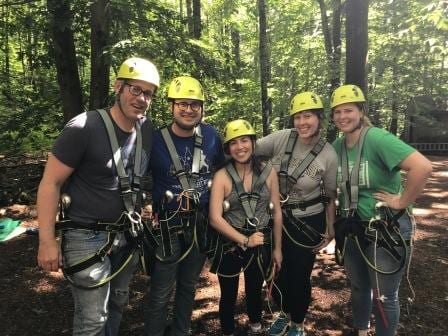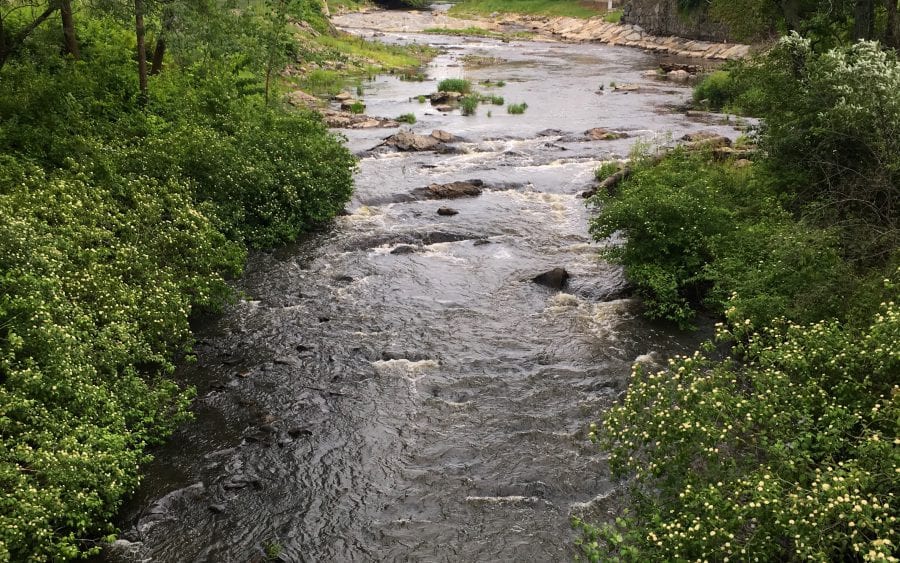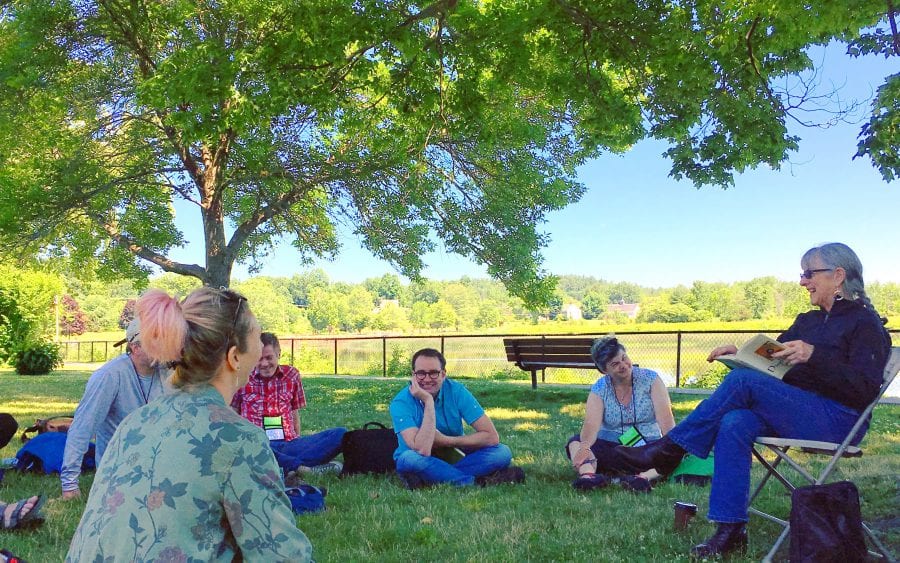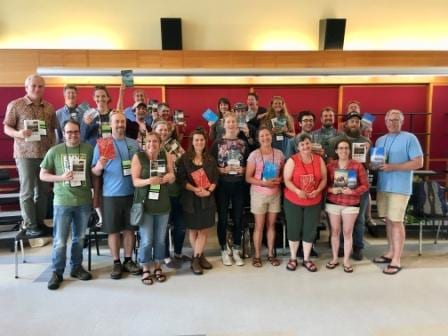By Stephen Siperstein, Choate Rosemary Hall Academy; Jason BreMiller, Phillips Exeter Academy; and Mark C. Long, Keene State College
From June 24-29 at Phillips Exeter Academy in Exeter, NH, the Environmental Literature Institute (ELI) held its third annual week-long professional development institute for secondary and higher education teachers. ELI provides a space for participants from around the country and from a range of contexts and backgrounds to join a growing Environmental Humanities education community and develop their own courses, curricula, and programs.

ELI 2018: Ropes Course
In addition to Jason BreMiller, Stephen Siperstein, and Mark Long, the 2018 ELI leadership team included Annie Merril of Davidson College and Laird Christensen from Green Mountain College. Annie led morning workshops on environmental justice and natural history, and Laird led participants in a two-part workshop on place-making. Also in attendance were Chelsea Steinauer-Scudder, co-editor of Emergence Magazine (who led a workshop on multi-genre writing); Andy Fersch, founder of the Penn School (who contributed his knowledge of starting an educational nonprofit); and Sophie Robinson, executive producer of the 2016 climate change documentary The Age of Consequences (who hosted an evening screening of her film).
The week began with a grounding in place. On Monday morning we trekked down to the Exeter River–where the town had recently removed the Great Dam–and were joined by Paul Pouliot, Denise Pouliot, and Kathleen Blake, members of the Cowasuck Band of the Pentacook Abenaki people, along with Svetlana Peshkova, Professor of Anthropology at the University of New Hampshire. Paul Pouliot helped us reemphasize the indigenous narrative of the place; as he put it, “it’s important to remember that there was a time before the dam.” Out of this experience emerged some important questions that participants considered throughout the week, most notably: How can the work we do in our classrooms and Environmental Humanities education in general contribute to the larger project of decolonization?

Exeter River
On Monday evening, ELI welcomed as keynote speaker the esteemed author Linda Hogan. During her address, Hogan read poetry and discussed her new book project on human-animal relations. The next morning, Hogan led a field-based creative writing workshop by the tidal Squamscott River, where we encountered cormorants, osprey, and kingfisher living along the banks. Hogan not only helped us to experience a shared intimacy with the nonhuman world, but also to understand and that our task as teachers and writers must be to discover language and stories that can repair the ecological devastation and spiritual fragmentation damaging that world. As Hogan writes in her remarkable 1995 collection Dwellings, “what we really are searching for is a language that heals…one that takes the side of the amazing and fragile life on our life-giving earth.”

Linda Hogan leads a field-based creative writing workshop.
In the afternoons, participants and leaders collaborated during cross-pollination sessions, further building on ideas from the morning workshops and developing participants’ own courses and curricula. The week was also punctuated by community building activities, whether in the form of a ropes course adventure and Andy Goldsworthy art walk at the nearby ALNOBA center, a field trip to Rye Beach, or a socializing event at local nano-brewery Throwback. On the final evening, the group gathered at The Word Barn, a nearby community space that hosts readings, concerts, and writing workshops–an inspiring hub for emergent public humanities work. As part of a night of celebration, individuals from the group shared their poetry and other reflections from the week.
Ultimately the week was not only about how to better teach in the Environmental Humanities but also about how to approach teaching and learning as practices of healing. Recognizing the current political, social and ecological emergency in which we all live and work, we believe that educators need emergent spaces to co-create futures of care and flourishing (for both their students and themselves). Our vision is for ELI to continue contributing to the larger community of care being cultivated in ASLE as well as in other institutions and organizations focused on Environmental Humanities education. Here is what a few participants had to say about their experience:
I am leaving ELI with a renewed commitment to bring environmental justice into my classroom and a need to instill a sense of environmental and social stewardship in my students. The conference left me feeling refreshed to know that peers in other schools have similar concerns about environmental justice and sustainable practices in their communities. I feel we as educators have the power to hold our institutions and administrations responsible to commit to building climate change-responsive and sustainably-minded curriculum and culture. – Rochelle Devault, San Francisco University High School
I have been teaching at low-opportunity schools for 5 years now, with really limited resources and access to professional development. ELI re-invigorated my commitment to teaching and the environment. Being able to be a part of an intentional community that share resources, passions, failures, thoughts, reflections, in a safe and rigorous space is really what I need every year to serve my students best. I am so grateful for this experience. THANK YOU! – Kristin Fischer, Swiss Semester and University of Michigan New England Literature Program
Although ELI is about the relationship between words and the environment, words cannot describe the changes that take place during the week long experience. In so many ways, ELI has been the most profound endeavor in my development as an Environmental Educator. – Brent Deisher, Morristown Beard School, NJ

ELI 2018 Participants
If you’re interested in learning more about ELI or want to contribute to this growing community of educators, we’d love to be in touch. Contact Jason at jbremiller@exeter.edu, Stephen at ssiperstein@choate.edu, or Mark at mlong@keene.edu
Registration for ELI 2019 will open in November, 2018.
